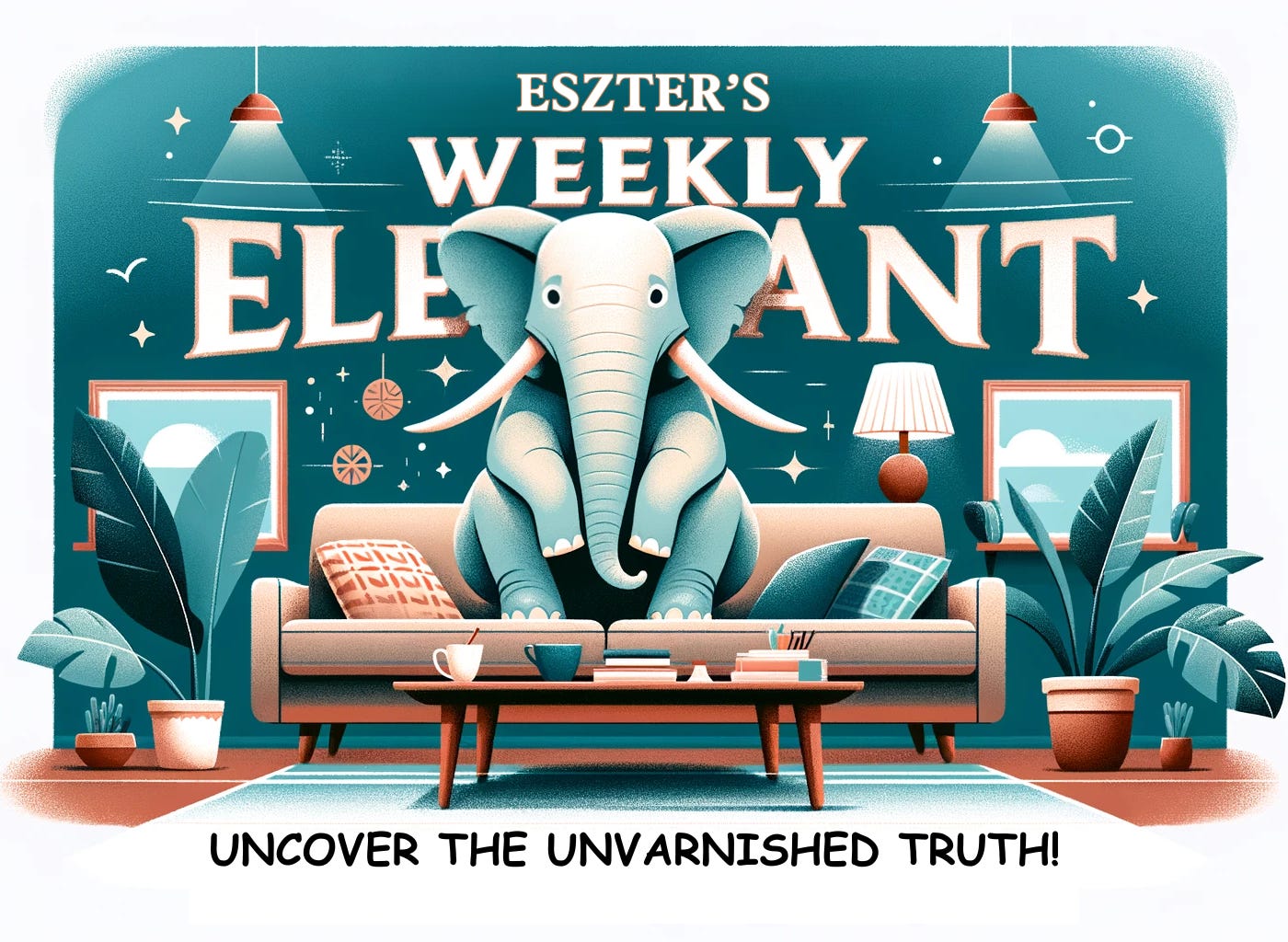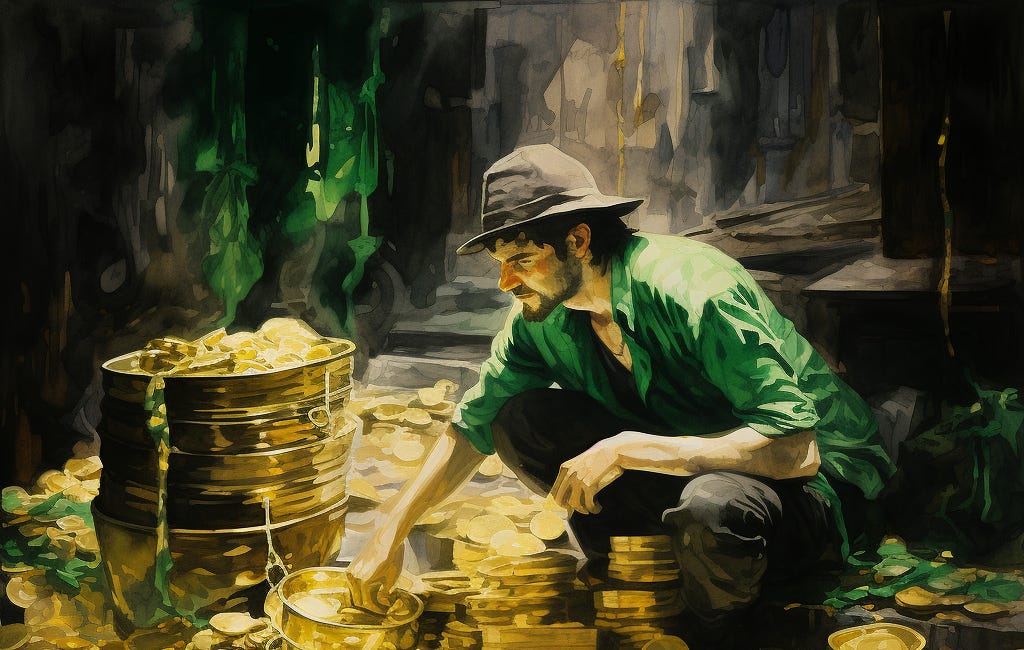Welcome to the ninth issue of Eszter’s Weekly Elephant! We hope your week has been pleasant so far! Let's dive into this week's topics.
This week, we continued our discussion on life energy
This topic is crucial because most of us do not realize that money is not our most important resource; rather, it is our life energy. The world—erroneously and deliberately—conveys the message that money is what we need to solve our problems, what is necessary for survival, and what we must prioritize above almost everything else.
However, if we strip things down to their essence, we will see that this is not true. One only needs to watch Jon Jandai's TED talk or spend some time in a village where people are still able to grow their own food and store what they need.
One branch of my family originates from a village, and although my grandmother lived in the city, we often visited relatives during my childhood. Witnessing the vegetable gardens, the chickens, and the orchards was always a wonderful experience, even as a child when I didn't fully grasp the amount of work involved in growing plump peaches, combating aphids on tomatoes, or making delicious plum jam for dinner.
When my husband and I moved from the city to a small village and began revitalizing a completely barren garden that had been thoroughly plowed over, I truly understood the extent of work required in gardening. As we dedicated hour after hour to beautify the garden, and then to watering pea seedlings, weeding pumpkins, and staking tomato plants the following year, we gradually realized we had created a garden. A beautiful garden filled with carefully selected, colorfully leaved plants where roses bloomed, and from which we harvested strawberries, a few raspberries, countless pumpkins, peas, and plums. We made so much plum jam from those plums that we still have a few jars left to this day, and they remain edible even after three years!
Experiencing how a few planted seeds could grow into abundantly fruiting plants changed our perspective. The constant sense of scarcity promoted by consumer society was replaced by a sense of abundance. Simply saving the seeds of two tomatoes for the following year yielded fifteen to twenty seedlings, which in turn produced twenty to twenty-five tomatoes each in one season. Viewing this from a financial perspective, and simplifying by not accounting for the water we used or the labor hours, nature converted one dollar (one seed) into 25 dollars (25 tomatoes), which if replanted, would yield, say, 10 viable seeds from each, resulting in 250 tomato plants, each bearing 25 tomatoes. That totals 6250 tomatoes.
By this logic, we would have turned one dollar into 6250 dollars in two years. In the financial world, this would be deemed a significant profit, even if we deducted labor hours and water. Achieving a 6250-fold profit in two years is rare in the financial realm, right? This illustrates how the world intentionally fosters a sense of scarcity around money. Otherwise, why would the state compel people to work on an assembly line or spend their entire day in a noisy office when the sun is shining outside? When earning a living requires money and money is hard to obtain, only awarded in exchange for hard labor, people resign themselves to their fate, and most end up in jobs they despise.
However, nature shows us that it doesn’t have to be this way. I'm not suggesting that growing food isn't hard work—far from it. But I aim to highlight that while people barely earn enough at their jobs to live comfortably and save money, often feeling as if they're fighting an uphill battle, nature offers a different paradigm.
A paradigm well worth experiencing, even if one ultimately opts for office work over gardening. Because until we witness firsthand how much nature assists us—the sun ripening the harvest, the soil providing nutrients with minimal intervention, and in many places, minimal need for watering—we can't fully appreciate what it feels like when a system operates supportively and our invested energy returns abundantly, not merely minimally. Without this paradigm, thriving and succeeding in urban life may seem impossible.
It’s not about everyone needing to tend their own garden and grow vegetables and fruits but about reintroducing a long-lost feeling into our lives. The feeling that our work, our attention, and our invested energy yield abundant results. This is critically important even for those who choose to live in the city and work in an office or factory. Because if the belief that one can thrive and be successful is deemed an impossible feat in our minds, our chances of success and prosperity in our urban careers are slim.
As I wrote in Eszter’s Weekly Elephant #7, indeed, more and more evidence shows that we ourselves create our reality, and the things we consider impossible often elude us. From my experience, whether we view the world as a supportive system or as a hostile, obstructive one fundamentally determines what we will achieve with our work, and until we change our fundamental beliefs, we will indeed achieve the same results.
This is precisely why gardening and growing plants are so important, as they rewrite the belief in scarcity and the belief in struggling alone, thus helping even in launching an office career.
That's also why Jon Jandai's talk is worth listening to, as it puts our lifestyle, detached from nature and manual labor, into context. Even if we don't want to simplify our lives as much as he does, from his perspective, we can surely find elements in our lives that we only think we need but actually complicate our lives and would be better off letting go. On the other hand, it shows us that there's always the possibility that, if things get really tough, we can let everything go, move to the countryside, cultivate a plot of land, and create our livelihood. As long as we have life energy within us, we will not starve.
And here, I believe, it becomes clear why life energy is the most valuable thing in this world. Yes, money can buy many things, but in a real crisis, when everything collapses, money is worthless. Over the past decades, we've lost sight of the most important thing and allowed the knowledge that humanity survived on for centuries to disappear.
Human energy, attention, and cooperation with the natural, not artificial, world bring abundant results, and in this process, money plays almost no role. The main actors are nature and human life energy, which plants, cares for, harvests, and then preserves things. So, what is truly valuable for our survival? Money or life energy?
The question then is, do we treat our life energy, or in other words, our attention, as carefully and well as we do our money? Do we protect it, think carefully about what or whom we spend it on? Or do we waste it on insignificant conversations, on activities through which it flows away but creates nothing of value?
If we viewed our daily amount of life energy the way we view the money we plan to spend that day, would we still gossip with our colleague? Would we still not say no to the energy vampire neighbor even if we felt uncomfortable, or would we choose to spend our time playing with our dog? Would we really eat in a fast-food restaurant just to return quickly to the office instead of sitting down in a cheap eatery to have a hearty, two-course meal?
If we truly made conscious decisions about our next activity, recognizing that the life energy we can allocate for the day is finite and considering our goals, which we have long wanted to achieve, what would we choose?
I once heard a story about a pianist who was approached by a fan who, admiring his play, said, ‘I would give anything to be able to play the piano like you!’ The pianist smiled and replied, ‘Would you practice twelve years for eight to nine hours a day?’ The fan's smile faded, and he walked away.
Although the pianist's response was not exactly kind, this story perfectly illustrates the power of our focus and attention, or our life energy, and our choices on how we spend our life energy. We either squander it, scatter it, or focus it.
I hope I have managed to convey some interesting thoughts, and perhaps the kind reader will also consider planting a few tomato plants or pumpkins, even on their terrace in a pot, and perhaps examining how their life force energy is distributed.
Last week, we tackled a frequently mentioned topic. We felt it necessary to delve deeper into this subject because, although there's often discussion about who energy vampires are and how and why they drain others' life energy, the reasons why someone allows themselves to become a victim of an energy vampire have rarely been explored. The issue of lacking boundary protection is frequently brought up, but the deeper reasons why our boundary protection might fail are seldom discussed. This article focuses on these reasons and offers insights into why we might find ourselves vulnerable to energy vampires. For those interested in reading the article, you can find it here:
Building on last week's discussion, this week you can discover the methods that most effectively replenish life energy reserves and which of these methods are our favorites.
Additionally, a short story has been published on the site alongside the article. It underscores the importance of closely examining even our most intimate relationships. There are relationships that, by our own definition, we consider essential to our lives and believe are surely based on love. However, an objective examination often reveals this isn't always the case. It is frequently these very relationships that deplete our zest for life and our life energy. Recognizing this and taking timely action is crucial.
For those who haven't yet, do read the latest 150-word story. It's less a story and more a moment—a wonderful moment indelibly imprinted in our memories. Our beloved dog Töki, who crossed the rainbow bridge at the age of seventeen, may no longer be with us, but his memory vividly lives on in us.
We hope that this week we've provided you with exciting information and entertaining stories again!
Thank you for reading Eszter's Weekly Elephant regularly. We are delighted that you find our writings interesting and hope we can welcome you among our paid subscribers!
Your support makes a whole world of difference; it is what keeps us going! :)
Sincerely,
Here is my personal email for paid subscribers, you can ask personal questions and receive personalized answers to those you might not wish to ask publicly.
Disclaimer: The content in our publications should not be considered professional psychological or psychiatric advice. Thus, everyone reads the posted writings and applies their content at their own risk.
Home | Notes | Articles | Eszter’s Magic | Literary Bonbons | Short Stories and Guides | Beyond the Book | EWE Issues | Archive | About








